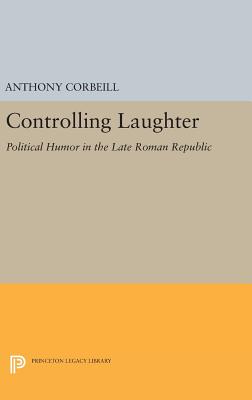

 Princeton University Press
Princeton University Press
Controlling Laughter: Political Humor in the Late Roman Republic


Key Metrics
- Anthony Corbeill
- Princeton University Press
- Hardcover
- 9780691631776
- 9.21 X 6.14 X 0.63 inches
- 1.21 pounds
- Political Science > Political Process - General
- English
 Secure Transaction
Secure TransactionBook Description
Although numerous scholars have studied Late Republican humor, this is the first book to examine its social and political context. Anthony Corbeill maintains that political abuse exercised real powers of persuasion over Roman audiences and he demonstrates how public humor both creates and enforces a society's norms.
Previous scholarship has offered two explanations for why abusive language proliferated in Roman oratory. The first asserts that public rhetoric, filled with extravagant lies, was unconstrained by strictures of propriety. The second contends that invective represents an artifice borrowed from the Greeks. After a fresh reading of all extant literary works from the period, Corbeill concludes that the topics exploited in political invective arise from biases already present in Roman society. The author assesses evidence outside political discourse--from prayer ritual to philosophical speculation to physiognomic texts--in order to locate independently the biases in Roman society that enabled an orator's jokes to persuade. Within each instance of abusive humor--a name pun, for example, or the mockery of a physical deformity--resided values and preconceptions that were essential to the way a Roman citizen of the Late Republic defined himself in relation to his community.
Originally published in 1996.
The Princeton Legacy Library uses the latest print-on-demand technology to again make available previously out-of-print books from the distinguished backlist of Princeton University Press. These editions preserve the original texts of these important books while presenting them in durable paperback and hardcover editions. The goal of the Princeton Legacy Library is to vastly increase access to the rich scholarly heritage found in the thousands of books published by Princeton University Press since its founding in 1905.
Author Bio
Basil L. Gildersleeve Professor of Classics and Director of Undergraduate Studies. His research focuses in particular on Roman sexuality, education, and rhetoric. He is the author of Controlling Laughter: Political Humor in the Late Roman Republic (Princeton, 1996); Nature Embodied: Gesture in Ancient Rome (Princeton, 2004); and Sexing the World: Grammatical Gender and Biological Sex in Ancient Rome (Princeton, 2015), which received a 2016 Charles J.
Goodwin Award of Merit from the Society for Classical Studies. He is currently co-authoring a commentary on Cicero's De Haruspicum Responsis with Andrew Riggsby (University of Texas at Austin).
Research Interests
My research focuses on the cultural history of ancient Rome, a topic that I normally approach by beginning with a close examination of language and grammar. I
have published books on Roman humor and gesture, as well as on the significance of grammatical gender for ancient Latin grammarians and poets, and for an understanding of Roman religion.
I have also published on Roman literature and ancient sex / gender, and am currently writing a full-scale commentary on Cicero’s oration De haruspicum responsis with Andrew Riggsby (University of Texas, Austin).
Source: University of Virginia
Videos






Community reviews
Write a ReviewNo Community reviews